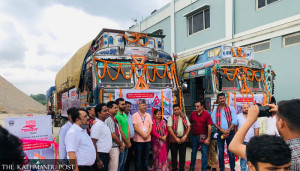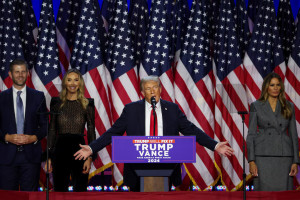Politics
UML, Congress remain split over BRI funding terms
But leaders insist it won’t strain their partnership in government as the deal was struck in presence of leaders from both the parties.
Purushottam Poudel
Nepal’s two largest and ruling parties were busy in internal meetings in the past few days. The Nepali Congress central executive committee met on Monday, while the CPN-UML held a meeting of the party's secretariat on Tuesday.
The main topic of discussion in both parties' meetings was Prime Minister KP Sharma Oli’s recent visit to China and the agreements reached during that visit.
The two parties, meanwhile, have differences over the visit and the eventual agreements, especially the framework for the BRI cooperation. The government on Tuesday made the copy of the BRI cooperation framework public.
Raghubir Mahaseth, a member of the UML secretariat and head of its foreign affairs department, said that the secretariat meeting had declared the prime minister's visit as a success. “As per last week’s deal between the two countries, projects would be implemented either through grants, loans or joint investment,” Mahaseth said.
But the Congress meeting insisted that Nepal cannot and should not accept loans to fund BRI projects, according to joint secretary of the party, Jeevan Pariyar.
“It has been our official stance that Nepal should not take loans to fund BRI projects. Our party understands the phrasing ‘Aid Assistance Financing’ in the BRI framework to mean that the country will take only grants,” Pariyar told the Post.
Prime Minister Oli, however, has said that it can be either a loan or a grant.
“BRI funding can be a loan, a grant, or joint investment," Oli said in Birtamod, Jhapa on Monday. “Some people are shouting without understanding what BRI actually means.”
“If the BRI framework involves loans as well, why did the prime minister lie at a press conference at Kathmandu airport after returning from China, when he said there was no agreement to take loans?” questioned Congress joint general secretary Pariyar.
The Congress calling for developing BRI projects under grants does not mean the party is against cooperation with China, Pariyar said.
Congress former general secretary and influential leader Krishna Prasad Sitaula also says that the party’s decision on Monday on the financial modality for BRI projects is official.
When asked whether the two ruling parties’ differing understandings of the funding method for BRI projects will affect government functioning, Sitaula denied such a possibility.
“Even if the two parties have different views on the BRI financing modality there should be no difficulty in cooperation,” Situla told the Post.
Mahaseth echoes Situala. The agreement was done in presence of leaders from both the parties so it should not attract any confusion, Mahaseth said.
“For us, the only thing that matters is the opinion of the establishment wing of the Congress,” says UML publicity department chief Rajendra Gautam. Gautam says that what other Congress leaders say on the issue is not so important, given that the establishment wing of the Congress has already welcomed the agreement on BRI cooperation.
“Congress President Sher Bahadur Deuba himself has endorsed the agreement between Nepal and China under the framework for BRI cooperation,” Gautam said. “To manage the political camps in the party, they might be saying different things, but that does not carry any importance.”
Again, there is no particular reason to oppose the agreement between the two countries since the agreement was done as per the blueprint prepared by a Congress-UML task force, Gautam stressed. Also, the agreement was inked in presence of Foreign Minister Arzu Rana Deuba who is also a leader of Congress, Gautam said.
Not only on the issue of BRI, the Congress also appears to be dissatisfied with other agreements reached during the Prime Minister Oli’s visit to China and some of the points made in the joint statement.
Govindaraj Pokharel, Congress leader close to Shekhar Koirala and a former chair of the National Planning Commission, gave a few reasons suggesting that Nepal has deviated from the conventional foreign policy of the country which is non-alliance and the Panchsheel.
Nepal used the Chinese name Xizang for Tibet and by agreeing to firmly support China’s effort to reunite Taiwan into mainland China, Nepal deviated from its foreign policy, Pokharel argued.
Head of Foreign Affairs Department of UML, Mahaseth challenges Pokharel saying, “The agreement done during Prime Minister’s China visit aligns with the foreign policy of the country.”
Nepal has been a staunch supporter of One China and the agreement has not deviated from it, Mahaseth added.
“Being the signature party on the framework for the BRI cooperation under the ‘Aid Assistance Financing’, the Congress in future only can raise questions on the terms and conditions of the financial assistance, but it has to abide by the agreement. So supporting the document was a mistake by the party,” says Pokharel.
The coalition government of Congress and UML has agreed to take soft loan, grant and technical assistance for the projects of Nepal’s interest under the BRI. Despite the party's official decision not to take loan, what made party members agree on the ‘Technical support and Aid Financing Modality’?” questioned Pokharel.
Pokharel also hinted that the issue of agreement reached would stir up controversy in the party.




 5.12°C Kathmandu
5.12°C Kathmandu















